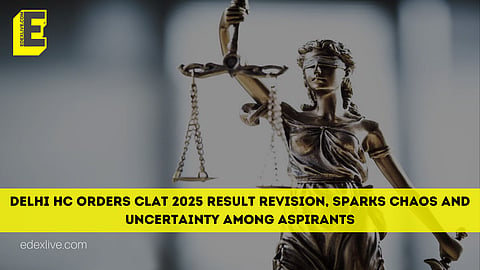

The Delhi High Court’s (HC) recent directive to the Consortium of National Law Universities (CNLU) to revise the results of the Common Law Admission Test (CLAT) 2025 has sparked fresh controversy and confusion among aspirants.
The court’s order addressed errors in two questions — 14 and 100 — in Set A of the exam paper, instructing that Option C be upheld for Question 14 and Question 100 be excluded altogether.
This ruling, which followed a plea by 17-year-old Aditya Singh, highlighted glaring inconsistencies in the consortium’s handling of the answer key and results, further amplifying dissatisfaction among students.
Justice Jyoti Singh’s 29-page judgment underscored the consortium’s obligation to rectify demonstrable errors, stating that ignoring them would be an injustice to candidates. While the consortium argued against the petition, citing jurisdictional limitations, the court ruled in favour of transparency and fairness. However, the ripple effects of this decision have left students and educators grappling with the aftermath of systemic flaws in the examination process.
Shorya Goswami, a student at NALSAR University and a mentor for CLAT aspirants, shared that the controversy is rooted not only in the errors themselves but in the consortium’s lack of transparency.
“The results were declared earlier than the notified date, and the final answer key wasn’t released before the results. Students challenged incorrect answers in the provisional key, but the consortium failed to address these issues properly,” he explained.
Goswami emphasised that this procedural failure has created immense uncertainty for aspirants, many of whom now face delays and confusion about the revised merit list and counselling process.
Saiyed Anzer Abbas, Co-founder of CLATapult Education LLP, criticised the consortium’s approach to handling grievances. “There is no proper grievance redressal system in place. The consortium wasn’t even willing to listen to students’ concerns until the high court intervened. This opacity is unfair and breeds distrust,” he said. Abbas also highlighted a recurring issue with the evaluation of OMR sheets.
“Students have reported discrepancies between their calculated scores and the results they received. While such errors could be attributed to the scanning process, the consortium’s dismissive attitude toward these complaints has fueled frustration,” he added. He warned that this erosion of trust might lead to more petitions and a growing perception of the consortium as an unreliable body.
Adding to the voices of discontent, CLAT 2025 aspirant Agneyo Das recounted his experience with this year’s exam, calling out the consortium’s mishandling of certain questions.
“Question 100 in analytical reasoning was unsolvable, with all the options being incorrect. It wasted a lot of time in an exam where every second matters,” he said. Das also pointed to the flawed answer key and the chaos surrounding the registration and counselling process.
“The registration window has closed, and many students who didn’t apply due to low scores may now find themselves with improved ranks but no chance to participate. This is not their fault, yet they’re the ones who’ll suffer.”
The psychological toll on students is undeniable. Abbas sympathised with aspirants who might see their ranks drop due to the revised results. “Think about the student who was confident of getting into a top law university, only to be told it was all a mistake. This mental trauma is deeply unfortunate,” he said.
Das echoed this sentiment, expressing hope that the consortium reopens the counselling window to ensure no student is unfairly excluded. However, he voiced skepticism, pointing out that the grievance portal opened earlier this month appeared to be a mere formality.
“The consortium proceeded with the counselling process without resolving any issues. This lack of accountability is what worries us,” he remarked.
As students await clarity from the consortium, the situation highlights broader concerns about systemic flaws and the need for reform. The high court’s order may have provided temporary relief, but the underlying issues — opaque processes, inadequate grievance mechanisms, and a disregard for student welfare — remain unresolved.
For the thousands of aspirants who dedicate years to preparing for CLAT, the consortium’s handling of these controversies is a test of trust they cannot afford to fail.
